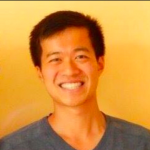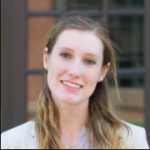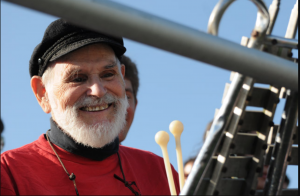German major and alum, Ezra Kauffman ’18, recently returned from a fantastic year teaching English in Innsbruck, Austria on a program administered by Fulbright Austria. He taught students 14-19 years old at a large technical high school. Ezra embraced the opportunity to spend as much time in the mountains as possible, so in his free time, he hiked, skied, and ran. He wrote, “although I learned Hochdeutsch at Wesleyan and lived with four Germans in Innsbruck, it was fascinating to hear the Austrian dialect, where the intonations and vocabulary can change depending on the valley.” He took an intensive German course at the Innsbruck Universität, which vastly improved his vocabulary and speaking confidence. He hopes to continue speaking German in New York, where he recently started a job working in business development at a real estate technology company.
Fellowship opportunities in Germany
|
|
|
The Congress-Bundestag Youth Exchange for Young Professionals (CBYX) is a year-long fellowship that gives students and recent graduates the opportunity to study and work in Germany. CBYX for Young Professionals is open to students in all fields of study and at all levels of study, including graduating students. |
|
CBYX is sponsored by the U.S. Department of State with funding provided by the U.S. Government and German Government and is administered by Cultural Vistas and the GIZ. More information and the online application can be found at www.CBYX.info. |
|
The CBYX program annually provides up to 75 participants with:
|
|
Prior German language knowledge is not required, though it is preferred. Applicants should have clear career goals and some relevant work experience in their career fields, which may include summer, part-time, or internship work. Participants must be between the ages of 18.5-24, possess a high school diploma or equivalent, and be U.S. citizens. |
|
The application deadline for the 2019-2020 program is December 1, 2018. For a more detailed overview of the program, we invite you to attend our CBYX Informational Webinar on October 22 at 3:30pm EST. Please RSVP by sending an email to Ronda Rutherford. |
Internships in Germany and in the U.S.
Cultural Vista’s internship and work abroad programs allow students and professionals to develop the expanding set of competencies demanded in today’s global economy through sustained immersion in a foreign country – language learning, interdisciplinary problem solving, empathy, and respect for cultural attitudes and ideas, to name a few.
Sissi- A German Musical
 Familiar with Sissi, the Bavarian princess who later became Empress Elisabeth of Austria? You might have been familiar with the classical figure, cast by Romy Schneider. However, the sweet royal fairy tale is neither the true nor the whole story…Come to Boger 112 around 7 pm, October 13th and enjoy a German Musical. The screening is hosted by German Haus!
Familiar with Sissi, the Bavarian princess who later became Empress Elisabeth of Austria? You might have been familiar with the classical figure, cast by Romy Schneider. However, the sweet royal fairy tale is neither the true nor the whole story…Come to Boger 112 around 7 pm, October 13th and enjoy a German Musical. The screening is hosted by German Haus!
Elisabeth is a German-language musical commissioned by the Vereinigte Bühnen Wien (VBW), with book/lyrics by Michael Kunze and music by Sylvester Levay. It portrays the legendary life and death of Empress Elisabeth of Austria.
This is a German musical, but English subtitle will be provided. So don’t worry whether your German is proficient enough. There will be an intermission between Act I and Act II. Refreshments will be served. The audience is welcomed and encouraged to bring friends who might also be interested.
Please contact Binxin Wang if you have any questions.
Career Day: Studying and Working in Germany
Representatives of German business, universities and foundations will inform about study and career opportunities with German and in Germany.
For more information, go to Career Booster Germany.
German Studies Majors and Minors News
 Adam Rashkoff Baltner ’13 (GRST major) has been living in Vienna for the past few years. From 2013-2015, he taught English at two high schools in Vorarlberg, Austria. He then worked for another year as an English teacher at a technical school in Vienna. Since 2015, he has been in a Master’s program in the Department of German at the University of Vienna. He just finished all his course work and is currently writing his thesis. Adam recently published an article about the teacher strikes in the United States which was published on the Austrian political blog Mosaik.
Adam Rashkoff Baltner ’13 (GRST major) has been living in Vienna for the past few years. From 2013-2015, he taught English at two high schools in Vorarlberg, Austria. He then worked for another year as an English teacher at a technical school in Vienna. Since 2015, he has been in a Master’s program in the Department of German at the University of Vienna. He just finished all his course work and is currently writing his thesis. Adam recently published an article about the teacher strikes in the United States which was published on the Austrian political blog Mosaik.
Adam is married and will become a father in October.
 Madalene Smith-Huemer ’14 (GRST/HIST major) has been pursuing an M.S. in Foreign Service at Georgetown University and is spending the summer working at an anti-human-trafficking NGO in Belgrade, Serbia, called Atina. Her work includes helping to teach German at the refugee camps near Belgrade and designing and writing a guidebook for Serbian employers on how to hire refugees.
Madalene Smith-Huemer ’14 (GRST/HIST major) has been pursuing an M.S. in Foreign Service at Georgetown University and is spending the summer working at an anti-human-trafficking NGO in Belgrade, Serbia, called Atina. Her work includes helping to teach German at the refugee camps near Belgrade and designing and writing a guidebook for Serbian employers on how to hire refugees.
Wy Ming Lin ’16 (GRST/NS&B) is currently working at a psychology research lab at New York University following his year-long stay in Cologne and Leipzig through the Congress-Bundestag Youth Exchange Program. Wy Ming will be moving to Germany in the fall to pursue a Master’s degree in Neural and Behavioral Science at the University of Tübingen in Baden-Württemberg. He is looking forward to speaking German again, enjoying some German beer, and visiting friends around the country!

Philip Katz ‘17 (GRST/HIST) is planning to apply to law school in the fall while continuing to work as a paralegal in New York.
Carter Deane ’18 (CSS major and GRST minor) will be spending this summer working at a restaurant before moving to Köln with the support of DAAD’s 10-month Research Fellowship. The latter will allow him to continue his research on the legal history and current status of Islamic religious groups that remain unacknowledged by the government of Nordrhein-Westfalen. His research will be centered around recently unsealed documents in the State archive which detail the first application for official status and rights by an Islamic religious community. This first application, like all those that followed, was ultimately rejected by the State.

Jack Guenther ’18 (GRST, HIST, COL) received high honors for his honors thesis, “‘Gateway to the World’: Hamburg and the Global German Empire.” He graduated with University Honors, received the Blankenagel Prize and Robbins Memorial Prize, and was inducted into Phi Beta Kappa. Jack has received a full scholarship for a 5-year Ph.D. program in history at Princeton University. This summer he will return to Hamburg, Germany to do more research at the Warburg Archive.

Katherine Paterson ’18 (THEA/ENVS and GRST minor) completed an honors thesis in Theater this year called (at)tend, which explores urban farming and theater as sites of coming together and building community. The thesis included a performance component which involved building a greenhouse and growing vegetables. This year, Katherine received the Outreach and Community Service Award from the Theater Department and the Sophie and Anne Reed Prize for the best poem/group of poems. She was inducted into Phi Beta Kappa last fall. Future plans include touring with a production of up your aesthetic in July. up your aesthetic, a former Wesleyan theater capstone project, premiered in the Theater Studio in the spring of 2017. The show is touring in upstate New York, Vermont, Philadelphia, and ending at the Capital Fringe Festival in DC. If you are in the area, please come see it! After the tour, Katherine plans to continue working in the theater, eventually making the move to New York City in the fall. Hopefully German will find a way into these plans as well!

Sophia Shoulson ’18 (GRST/COL) received high honors for her thesis, “All Tales Are True.” She received the Prentice Prize and was inducted into Phi Beta Kappa last fall. After graduation, she will work at the Yiddish Book Center in Amherst, MA.

Christina Sickinger ’18 (GRST/ECON) received the Scott Prize for her work in German Studies, the Plukas Teaching Apprentice Award, and she was inducted into Phi Beta Kappa last fall. She is working for Aberdeen Standard Investments in Manhattan.

Chris Steidl ’18 (GRST/HIST) will be moving to Boston in September to do nonprofit work! Still up in the air is what that work will be, but he is as always optimistic and open for whatever comes.
Caroline Adams ’19 (GRST/AMST) will be living in Brooklyn this summer where she conducts research for Professor Bork about family history and German-Jewish immigration during the 19th century. She will also be delving into research for her own German Studies senior thesis about Karl May’s indianer novels and their impact on modern cultural perceptions of indigenous life in German culture. Additionally, she is taking a class at Brooklyn College and learning for the first time how to navigate the New York subway system! She is very excited to pursue this research with the generous help and support from the Helmut und Erika Reihlen fund, Professor Bork, Professor Winston and the German Studies department! She is looking forward to a wonderful, wonderful, German-centric summer!
Anna Apostolidis ’19 (GRST/ANTH) received the Blankenagel Prize and a scholarship from the GRST Helmuth and Erika Reihlen Fund to support her research in Berlin this summer. Anna will be spending four weeks in Germany’s capital where she will conduct archival research on the Humboldt-Forum’s planning, looking at correspondence and records of buildings and exhibits.

Lizzie Whitney ’19 (GRST/COL) will be spending part of her summer in Hamburg and Berlin. In preparation for her honors thesis, she will see as many plays as she can and explore how classic German texts are performed and reinterpreted in the contemporary sociopolitical climate. For her research project, she received funding from the GRST Helmuth and Erika Reihlen Fund.
Lily Davis ’20 (FGSS/PSYCH major and GRST minor) will be interning at an organization called Environment Oregon. She is working on a campaign to keep plastic out of the Pacific Ocean and keep our planet safe.
OUR STUDENTS ABROAD
Will Bellamy ’19 (GRST/ENGL), Hannah Cooper ’20 (GRST/FILM), and Scott Walkinshaw ’20 (GRST/COL) are currently studying with the Smith program in Hamburg. Karen and Julia from Smith College the Hamburg program director, Jutta Gutzeit, together with Wesleyan students Will, Hannah, and Hendrik recently visited Professor Bork in Hamburg-Blankenese. After a walking tour through this picturesque village on the Elbe River, they relaxed for a few hours on Frau Bork’s balcony with Kaffee und Kuchen. As the German semester is still in session, they are busy studying before they can ultimately relax and enjoy their well-deserved vacation.
Will is currently also collecting material for his honors thesis. He is planning to write about the Austrian writer Elfriede Gerstl (1932-2009).
Hannah has been focusing this semester has been on improving her language skills and exploring German culture and history in the decades following the Second World War. She’s looking forward to returning to Wesleyan in the fall to continue her studies.
With great sadness we share this news
Our colleague and friend Peter M. Frenzel, Marcus L. Taft Professor of German Studies, Emeritus, passed away on Sunday, May 20, 2018, at the age of 82.

Peter arrived at Wesleyan in 1966 after receiving his B.A. from Yale, M.A. from Middlebury, and Ph.D. from the University of Michigan. He retired in 2003 after 37 years at Wesleyan. During his time here, Peter served on virtually every major committee, including Advisory and EPC, and he served in a number of administrative roles, including as an Associate Provost, Dean of Arts and Humanities, chair of German Studies, director of the Wesleyan Program in Germany, and as the Commencement Marshal. In his retirement, Peter served on the Advisory Board for the Wasch Center for Retired Faculty and was editor of the Center’s newsletter. He was a carillonneur who oversaw Wesleyan’s carillon bells, and he played the glockenspiel with the pep band during football games.
Peter was one of the foremost experts on the German Minnesang tradition of lyric- and song-writing, with particular expertise in the early forms of Medieval German literature and the connection between poetry and music. His scholarship on medieval music and literature and German music and culture of the 19th century contributed much to our knowledge of the Middle Ages.
His colleague Herb Arnold said, “Peter loved music in its more modern expression, as well, often sitting down at his piano for an impromptu riff or chasing the perfect Wagner Ring around the globe, visiting what seems like every operatic venue from New York to Sydney.”
Peter is survived by his wife, Laurie Neville Frenzel; grandchildren John Frenzel and Rita Frenzel; daughter Kim Frenzel and partner John Lucey; and his older brother, Robert. A memorial gathering will be held at the Wadsworth Mansion from 1:30 to 4 p.m. on Sunday, June 17, 2018. Memorial contributions can be made to the Cystic Fibrosis Foundation, P.O. Box 97372, Washington, D.C. 20090-7372, or to the Susan and William Wasch Center for Retired Faculty, c/o Jessie Steele, 51 Lawn Avenue, Middletown, CT 06457.
Katherine Paterson ’18 on Urban Farming, Communal Activity and Performance
 See also Olivia Drake’s article in Wesleyan Connection, May 2, 2018.
See also Olivia Drake’s article in Wesleyan Connection, May 2, 2018.
Alumni News
Wy Ming Lin ’16, a German Studies and Neuroscience & Behavior double major, is currently working at a psychology research lab at New York University following his year-long stay in Cologne and Leipzig through the Congress-Bundestag Youth Exchange Program. Afterwards, Wy Ming will be moving to Germany in the fall to pursue a Masters degree in Neural and Behavioral Science at the University of Tübingen in Baden-Württemberg. He is looking forward to speaking German again, enjoying some German beer, and visiting friends around the country!
Carter Deane ’18 wins DAAD scholarship
Carter Deane has been awarded the prestigious DAAD fellowship to spend next year in Köln.
This year we mark the 35th anniversary of Wesleyan’s sesquicentennial, on which occasion the then director of the DAAD in New York, Manfred Stassen, made Wesleyan a Partner-Universität. Manfred had taught in the College of Letters before going to the DAAD. He died in February in Bonn at the age of 78.
German Chancellor Fellowship
Launch your career in Germany – become part of a worldwide network
The Alexander von Humboldt Foundation is searching for the leaders of tomorrow – from Brazil, China, India, Russia, and the USA. The German Chancellor Fellowship offers you an opportunity to take the next career step in Germany – irrespective of your field of work.
In order to apply, develop your own project idea and find the host of your choice to mentor you. Once your host has confirmed, you can apply for a fellowship.
For more information visit the Humboldt Foundation
Second German Studies Colloquium
Lizzie Whitney (GRST/COL ’19) will lead a discussion (in German) on two pieces from Wladimir Kaminer’s Russendisko alongside a brief chapter from Hegel’s Aesthetik on “Der subjektive Humor.” I have attached the texts to this mail. Please feel free to distribute this invitation to other German speakers on campus.
Tuesday, March 6, from 4:30 to 5:30 p.m., in Boger Hall 113











